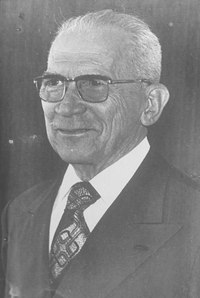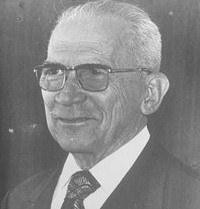Rio Grande, 1911 – São Paulo (Brasil), 1987
By: Emir Sader
 The principal ideologue of the Brazilian military dictatorship (1964-1984), Golbery do Couto e Silva was born in Rio Grande do Sul. He, along with the first dictator of that period, Humberto de Alencar Castelo Branco, served in the Brazilian troops sent to join American forces in Italy at the end of World War II. Both returned convinced of the need for a national security doctrine. Together, they founded the Escola Superior de Guerra (ESG), which trained a new generation of military leaders in that doctrine.
The principal ideologue of the Brazilian military dictatorship (1964-1984), Golbery do Couto e Silva was born in Rio Grande do Sul. He, along with the first dictator of that period, Humberto de Alencar Castelo Branco, served in the Brazilian troops sent to join American forces in Italy at the end of World War II. Both returned convinced of the need for a national security doctrine. Together, they founded the Escola Superior de Guerra (ESG), which trained a new generation of military leaders in that doctrine.
In the 1950s, Golbery played a key role in opposing the government of Getúlio Vargas, politically and ideologically orchestrating the military movement that culminated in the 1964 coup on April 1. As a general, he solidified his position and prestige as the regime’s chief ideologue. He implemented the national security doctrine by heading the Serviço Nacional de Informações (SNI), the regime’s security, intelligence, and ideological enforcement agency.
Among his works, Geopolítica do Brasil (1966) stands out, where he advocated for Brazil’s role as a regional imperialist subpower (or sub-imperialist power), focusing not only on South America but also on Africa—envisioning Brazil as a dominant power in the South Atlantic. He also developed a strategy for territorial occupation of Brazil’s interior, viewing it as a security measure to ensure state control over the national territory.
Golbery served in various governments during the military dictatorship, starting with Castelo Branco’s administration (1964-1966), where he created and led the SNI, and later in the governments of Ernesto Geisel (1974-1979) and João Figueiredo (1979-1985). During the Geisel era, Golbery was the mastermind behind the plan for a “slow, gradual, and secure” political opening, which aimed to introduce some democratic freedoms. This plan included partial amnesty for opposition members (1979) and the return of political parties, which had been banned. However, when he was unable to guide the transition to an electoral democracy at the pace and stability he envisioned, he withdrew from politics.



